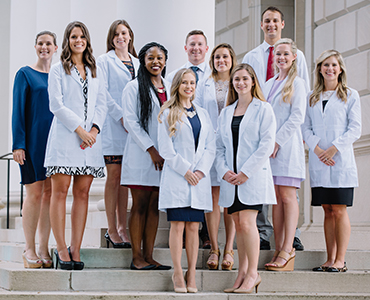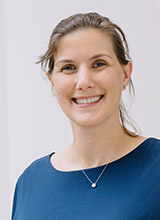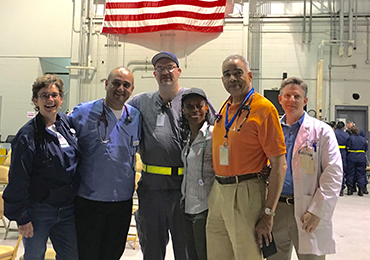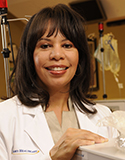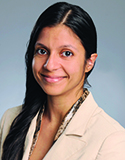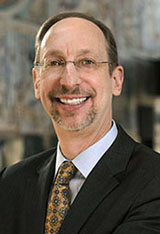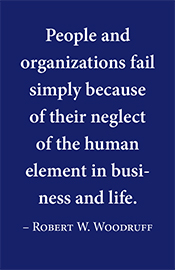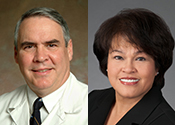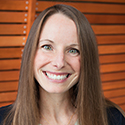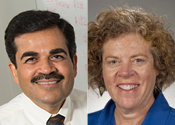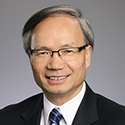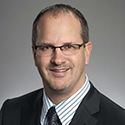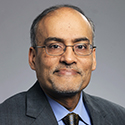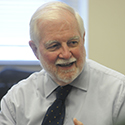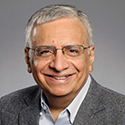
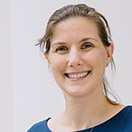
New program targets untapped market |

Latest Synergy awards |
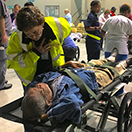
Hurricane relief efforts |

Finishing touches to new hospital tower |
|||||
| October 24, 2017 | ||||||||||||||
Woodruff Leadership Academy fellows for 2018
The following people have been named members of the class of 2018 of the Woodruff Leadership Academy. Chosen via a rigorous selection process from nominees throughout the health sciences, these fellows include both faculty and staff, as well as researchers, administrators, clinicians, and educators. Watch for more details about these fellows in an upcoming issue. - Maria Aaron, Prof, Ophthalmology; Assoc Dean, Graduate Medical Education - Greg Anderson, CFO, EUH Midtown - Hany Atallah, Assoc Prof, Emergency Medicine; Chief, Emergency Medicine, Grady - Jason Atkins, Chief Nursing Quality and Information Officer, Emory Healthcare - Patrick Bowen, Asst Prof, Endocrinology; Section Head, Endocrinology, Emory Clinic - Dimitri Cassimatis, Assoc Prof, Medicine (50% at Grady); Medical Director, Coronary Intensive Care Unit, EUH Midtown; medical student society leader - Edward Chen, Prof, Cardiothoracic Surgery; Director, Thoracic Aortic Surgery; Assoc Program Director, Thoracic Surgery Residency - Sushma Cribbs, Assoc Prof, Pulmonology; Assoc Program Director, Pulmonary/Critical Care Medicine Fellowship; staff physician, Atlanta VA Medical Center - Bassel El-Rayes, Prof, Hematology; Assoc Director for Clinical Research, Winship; Director, GI Oncology Translational Research Program - Michael Epstein, Prof, Human Genetics; Prof, Biostatistics and Bioinformatics; Director, Center for Computational & Quantitative Genetics - Toby Goldsmith, Asst Prof, Psychiatry; Director, Adult Psychiatry Outpatient and Women's Mental Health programs - John Horton, Asst Prof, Gynecology & Obstetrics; Director, General Gyn-Ob - Baker Hubbard, Prof, Ophthalmology; Director, Retina Service, Emory Eye Center; Vice Chief, Ophthalmology, Children's Healthcare of Atlanta - Adriana Ioachimescu, Assoc Prof, Endocrinology and Neurosurgery; Co-Director, Emory Neuroendocrine Pituitary Center - Victoria Jordan, VP, Quality, Emory Healthcare; Director, Performance Improvement and Analytics, Kennedy Initiative for Transforming Care - Doty Kempf, Assoc Veterinarian, Division of Animal Resources, Yerkes; Lead Research Specialist, Yerkes Imaging Center; Instructor, Pathology - Laura Kimble, Prof (clinical track) and Asst Dean, Clinical Advancement, School of Nursing - Robin Larocco, Manager, Bone Marrow Transplant Program, Hematology, Winship - Tim Lash, Prof, Epidemiology, RSPH; Leader, Cancer Prevention & Control Research Program, Winship - Brad Leshnower, Asst Prof, Cardiothoracic Surgery; Assoc Program Director, CT Surgery Residency; Chief Quality Officer, CT surgery, EUH - Maha Lund, Assoc Prof, Physician Assistant Program, Dept of Family and Preventive Medicine; Program Director and Division Chief, PA Program - Connie Masters, Specialty Director of Cancer Nursing, Winship Northern Arc - Anne Nelson, VP, Organizational Effectiveness and Talent Management, Emory Healthcare - David Prologo, Asst Prof, Radiology and Winship (Discovery and Developmental Therapies); Director, Interventional Radiology Services, Emory Johns Creek Hospital Nursing's new CRNA program targets untapped market
This fall marked the official start of Emory's new DNP Nurse Anesthesia Program. The first cohort of 10 students began the 36-month, full-time program in newly remodeled classroom space in the nursing school.
It was a happily hectic time for program director Kelly Wiltse Nicely, who juggled moving her staff into new office space and moving her family into a new home at the same time. She joined Emory last winter from the University of Pennsylvania, where she led the nurse anesthesia program during its transition from master's to DNP level. She planned to remain at Penn until Dean Linda McCauley recruited her to develop and lead a DNP-level CRNA (certified registered nurse anesthetist) program at Emory. When Nicely flew to Atlanta to look the nursing school over, she wasn't looking for a big change since she and her husband had two young children. Once she visited the school, she was sold. "I loved what the students and the faculty were doing," she says. "More than that, I loved the opportunity. I saw Atlanta as an urban center with abundant health care resources and an untapped market for CRNA education. When you look at other CRNA programs around us, they are geographically distant from us. The closest program in Georgia is at Augusta University. Other programs are in Alabama, North Carolina, and North Florida. So there was a hole here that needed to be filled." By 2022, all students admitted to U.S. nurse anesthesia programs must graduate with a doctoral degree, as required by the Council on Accreditation of Nurse Anesthesia Educational Programs. Consequently, schools with master's programs in nurse anesthesia are now transitioning to DNP programs. "We didn't have to do that here at Emory," says Nicely. "We had an opportunity to build a DNP program for CRNAs from the ground up." Students are spending their first semester in the classroom. Next semester, they will begin simulation training in the high-fidelity operating room in the Center for Experiential Learning in the medical school. They also will start clinical training later in the semester. Students will study and train year-round until they graduate in 2020. Thus far, Emory's CRNA program has agreements with 16 sites in Georgia and one in Tennessee for clinical training, with plans to add more. The sites offer students inpatient and outpatient experiences in urban and rural settings. Typically, urban sites use the anesthesia care team model, with a physician anesthesiologist and one or more CRNAs, while rural sites use a CRNA-only practice model. "Students will see everything from pediatrics, cardiology, and neurology, to thoracic surgery," says Nicely. "They will be exposed to different populations in different settings." Nationwide, approximately 55,000 CRNAs provide more than half of the anesthetics delivered yearly. Of those, 1,906 are licensed to practice in Georgia. With the graying of the nurse anesthesia workforce and the increasing demand for surgeries and other services, Georgia faces a significant provider shortage, especially in rural and underserved areas. With the second nurse anesthesia program in the state, Emory is positioned to attract more nurses to train and practice in Georgia. "In rural areas, the CRNA is often the only anesthesia provider," says Nicely. "Our program creates an opportunity to fill some of that need."—Pam Auchmutey New projects selected for third round of Synergy awards
Eleven proposals have been selected for funding in the third cycle of Synergy awards, which support collaborative projects among faculty at medicine, nursing, public health, Winship, Yerkes, and all other units in the WHSC. Proposals for the awards, which are funded by the Office of the EVPHA, are required to include faculty with primary appointments in at least two different schools/units as co-principal investigators. The awards are intended to support new, highly innovative projects that are not yet funded or published. Synergy awards offer up to $100,000 in support for an award term of one year, with potential carryover to a second year under special circumstances. "During this funding cycle we received 52 proposals, and the selection process included a committee of 75 reviewers," says David Stephens, WHSC VP for research. "I'm confident these new award winners will produce inspiring, high-impact results." The 11 selected proposals and their investigators are as follows: Defining the Impact of Hospital and Household Water, Sanitation, and Hygiene Conditions on Sepsis Outcomes in Normal and Low Birth Weight Neonates in Amhara, Ethiopia Improving Health-Promoting Behaviors in Adolescent Cancer Survivors Using AWAKE: A Feasibility Trial The Emory-Congo Brain Health Initiative: Enhancing Neurological Diagnosis with a Normed and Culturally Appropriate Neuropsychological Battery Morphometric and Functional Markers as Determinants of Perioperative Risk Development of a Novel "Humanized" Microbiome Mouse Model for Assessing the Influence of the Microbiome Within the Female Reproductive Tract on Health and Disease New Hereditary Kidney Cancer Syndrome? Smartphone-Enabled Supervised Exercise Therapy for the Treatment of Symptomatic Peripheral Arterial Disease Dissemination of Macrolide Resistance Elements in Streptococcus Pneumoniae Metagenomic Cartography of the Virome in Transplant Recipients A Systematic Analysis of Environmental Toxicants in Cardiomyocytes Derived from Human Induced Pluripotent Stem Cells Cell-Free DNA Methylation as a Biomarker of Pancreatic Beta-Cell Death in Youth
Emory faculty and staff have responded in various ways to needs of hurricane survivors, as described on an Emory web page set up to list ways people can help and to chronicle stories of how they have done so thus far. Among these are two Emory Johns Creek employees, Roland Tam and Angelina Trinidad, who went to Texas after Hurricane Harvey as volunteers for the Georgia 3 Disaster Medical Assistance Team. Others include a group of emergency medicine/nephrology physicians (see photo above) who met a plane transporting patients and family caregivers from the U.S. Virgin Islands to Dobbins Air Force Base for urgent medical evaluation following Hurricane Maria. According to Kate Heilpern (emergency medicine chair and one of the volunteers), most of the patients had end-stage renal disease (ESRD) requiring dialysis, and there were significant concerns that they had received inadequate dialysis in the preceding days. In addition, the team found other complex co-existing conditions, including diabetes, hypertension, pre-term labor, and recent trauma. EMS transported five patients to local hospitals. "The patients and family caregivers were exhausted from the recent hurricane disaster and travel but so kind and grateful for the assistance," says Heilpern. "I have been practicing emergency medicine for more than 25 years, and the opportunity to provide timely medical assistance for these patients and families is a hallmark of my career. I know it was as impactful for all the physicians and nurses who supported this humanitarian response. I am very proud of our providers and our institution." Read more.
Since early October, the Emory Dialysis Center at Candler also has treated ESRD patients from the U.S. Virgin Islands, adding an extra shift and relying on voluntary staff overtime to accommodate need. "We're still receiving calls about hurricane admissions," says nephrologist Janice Lea, medical director of the center. "We want to help however we can."
Surgeon Carla Haack saw many types of patient needs on a recent trip to Puerto Rico, where she worked with a volunteer team from Florida: "Some areas we were in hadn't seen any help before we got there 22 days after the storm. We provided medical attention to about 350 patients. . .and brought food, water purification systems, medications, mosquito repellent/netting, and solar lamps. . . . Diagnoses included. . .trauma, primary care (lots of diabetes and hypertension), infections related to floodwater, pulmonary problems related to mold in flooded homes, ENT, multiple sclerosis, autism, and, unfortunately, a fair share of suicidal ideation. The problems are very real, and they are not likely to have a quick or easy solution. The spirit of most people is undaunted and beyond awe-inspiring." In addition to these relief efforts, the nursing school is sending a team to Puerto Rico in December, working in partnership with the Salvation Army. Finishing touches to the new hospital tower
The sign is up, all interconnecting bridges are operational, and scheduled move-in of departments and units is almost finished, with completion of the hospital tower, which serves as Emory University Hospital's new "front door." The Clifton Café on level 2 has been open since July, and the first inpatient was brought into the facility in August. Both the outpatient pharmacy, formerly in Clinic A, and the Winship Radiance Boutique, formerly in Winship, are now located on level 2 of the new tower. Meanwhile, as units have vacated the original hospital building, space has been freed up for expansion and renovation of units remaining there. The recently renovated Bishop's Pantry reopened last month, and the Asbury Court servery (a section of which remains open) is undergoing renovation that is expected to be completed in December. |
| From the Executive VP
WHSC strategic plan progress
"Never look back unless you are planning to go that way."—Henry David Thoreau To help guide us forward over the next several years, broad stakeholder groups from across all units of the Woodruff Health Sciences Center (WHSC) have been working to draft a strategic plan that addresses discovery, education, prevention and care, and the places where those missions intersect. The faculty, staff, trustees, patients, and others involved in this effort have helped define new mission, vision, and values statements for the WHSC, and over the past four months, four subject matter expert (SME) teams have been working to develop very specific recommendations around four key themes: interprofessional education and collaborative practice, constructive culture, transforming models of care, and innovative discovery. The SME teams are currently bringing their recommendations to WHSC leadership, and we will continue to seek stakeholder input as we finalize the plan over the next few months. I look forward to sharing more about the strategic plan with you soon. Its development has been a terrific team effort, and the resulting document does a great job of capturing our true north and mapping a solid plan for its achievement. Please direct questions and comments to evphafeedback@emory.edu
Breiman, Levey elected to NAM
The National Academy of Medicine (formerly the Institute of Medicine) has elected Allan Levey (neurology) and Robert Breiman (global health) to its 2017 class of leading health scientists and international members. Read more. Surgical partnership between EHC and Navicent Health
Navicent Health in Macon and Emory Healthcare recently announced a clinical partnership that includes a formal restructuring of Navicent's cardiothoracic (CT) surgery service line, extending the range of CT procedures available to patients in Macon and the surrounding region. The collaboration is under the direction of CT surgeon Robert Guyton. He and his Emory colleagues will work closely with Navicent Health's current CT surgical team, who together have provided more than 35 years of care to patients in central Georgia. According to Guyton, the clinical partnership with Navicent is already under way. Emory cardiothoracic surgeon Omar Lattouf recently trained Navicent Health physicians on a new minimally invasive procedure to treat patients suffering from longstanding persistent atrial fibrillation. Read more. $6.8 million grant to RSPH for reproductive health research
The newly established Center for Reproductive Health Research in the Southeast (RISE) (public health) has received $6.8 million in funding for the next three years from a large, private, anonymous foundation. According to Kelli Hall, principal investigator, RISE is launching research to provide new knowledge about the social determinants of reproductive health in the Southeast and to identify evidence-based strategies to improve access to family planning care in the region. Read more. Grant will establish PT profession in Georgia (the country)
Emory has received a $4.5 million four-year grant from USAID to establish the profession of physical therapy in the country of Georgia. The Emory group involved includes Zoher Kapasi and Marie Johanson from physical therapy, Archil Undilashvili, Gordon Churchward, and Ken Walker. Faculty members and students interested in participation may contact Walker. Read more. NCI selects Emory for therapeutic research network
The National Cancer Institute has awarded $4.52 million to a team led by Haian Fu in cancer genomics at Winship to participate in a national network focused on discovery of new cancer targets and precision cancer therapies. Read more. Core facilities receive AAMC award
The Association of American Medical Colleges selected Emory Integrated Core Facilities, directed by Michael Zwick, as one of six winners nationally in its 2017 research program awards, recognizing exceptional initiatives that enhance research sharing in biomedical research. Read more. Improving symptoms of peripheral arterial disease
Researchers at the Emory Heart & Vascular Center have received $3.8 million to study the growth of new blood vessels to help improve symptoms of peripheral arterial disease (PAD). The grant, led by Arshed Quyyumi, will be used to investigate whether a drug used to restore white blood cell numbers during cancer treatment improves symptoms and blood flow in people with PAD. Read more. Emory program now taught in 30 US and Canadian medical schools
An Emory-cultivated program focused on teaching doctors and medical students to be more compassionate at the bedside has now become part of the curriculum at 30 US and Canadian medical schools, including Harvard, Stanford, Yale, UCSF, UNC, Vanderbilt, and others. A report on this multi-institutional faculty development program by William Branch and colleagues can be found in the online publication of Academic Medicine. Read more. Notable
Rafi Ahmed (director, Emory Vaccine Center) received the 2017 William B. Coley Award for Distinguished Research in Basic Immunology from the Cancer Research Institute, a nonprofit dedicated to fueling development of immunotherapies for all forms of cancer. Read more.
Yerkes researcher Brian Dias has been named a 2017 CIFAR Azrieli Global Scholar, one of 15 early-career researchers to receive this appointment, which includes $100,000 in research support. Read more.
Lucky Jain (currently interim chair) has been named chair of pediatrics, Kathryn Glas has been named interim chair of anesthesiology, and Haian Fu has been named chair of pharmacology in the medical school. Events Oct 26: Healthcare Innovation Symposium XX: Health Services Research. More info.
Nov 8: Veterans Day ceremony. 11:00, Emory Quad. More info.
|


